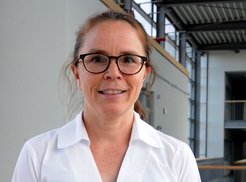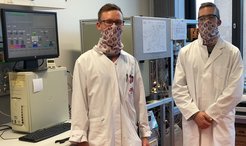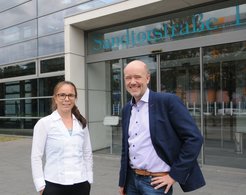Max Planck Sabbatical Award 2019 given to Jennifer Wilcox
Collaboration on CO2 Mineralization
Professor Jennifer Wilcox, US-American chemical engineer, focuses on minimizing negative impacts of humankind on our natural environment. She works on ways to test and measure methods of trace metal and carbon capture, to mitigate the effects of fossil fuels on our planet. One aspect is research on new ways to remove CO2 from the atmosphere.

Jennifer Wilcox has been Professor of Chemical Engineering at Worcester Polytechnic Institute, Massachusetts, United States, until summer 2020. She has accepted new positions with the University of Pennsylvania, Philadelphia, as Presidential Distinguished Professor of Chemical Engineering and Energy Policy and with the World Resource Institute.
The Max Planck Sabbatical Award enables a close research cooperation with the Max Planck Institute for Dynamics of Complex Technical Systems in Magdeburg, especially with its Process Engineering Group, led by Prof. Dr.-Ing. Kai Sundmacher, director at the institute. The aim is to find chemical processes to accelerate the transition from fossil to renewable raw materials, to organize a comprehensive circular economy for as many material streams as possible.
New Ways of CO2 Mineralization

Caleb Woodall, chemical engineer and Ph. D. candidate in the group of Jennifer Wilcox, took up his research work at his host institute on November 4, 2020, under consideration of all regulations and measures in the COVID-19-pandemic.
He says on the details and aims of the project: “Even during an unprecedented global pandemic, the problem of climate change still exists and must be addressed. I am excited to address this issue by conducting experiments with Professor Sundmacher and Andreas Voigt here in Magdeburg this winter. We will be investigating how to capture and store CO2 in wastes from a mine in Montana, USA. Successful tests could help pave the way to avoid additional emissions from mining operations and potentially help remove CO2 that is already in the atmosphere, helping to contribute to the fight against climate change.”

The Max Planck Society launched the Max Planck Sabbatical Award in 2018 in order to support scientists with outstanding qualifications and acknowledged research experience by awarding them research stays at and close collaboration with the Max Planck Institutes as well as flexible research funding. However, the award could be presented to Jennifer Wilcox due to the constraints of the COVID-19-pandemic not before October 2020.




